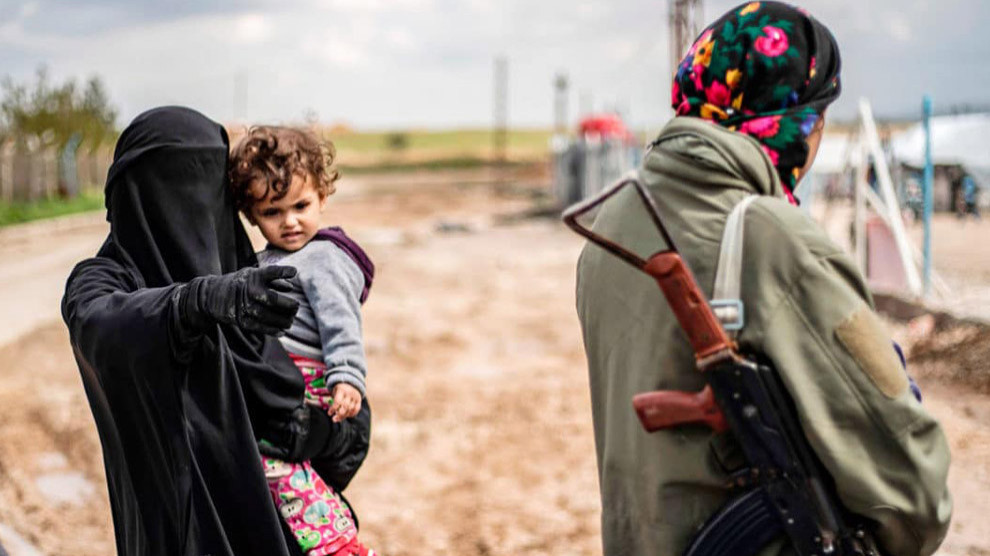Female body discovered in Hol Camp
In the Hol Camp in northern Syria, the lifeless body of an Iraqi refugee has been discovered. The Islamist-motivated violence in the camp has risen sharply parallel to the beginning of the Turkish invasion.
In the Hol Camp in northern Syria, the lifeless body of an Iraqi refugee has been discovered. The Islamist-motivated violence in the camp has risen sharply parallel to the beginning of the Turkish invasion.

In the Hol Camp, east of Hesekê, an Iraqi woman has apparently been killed by followers of the jihadist terrorist organization "Islamic State" (ISIS). The lifeless body of 27-year-old Fadila Ibrahim, which shows clear signs of a violent crime, was discovered on Wednesday morning by employees of the camp administration. An accident could be ruled out very quickly as a possible cause of death, as symptoms of massive blows to the head of the killed persons were detected. However, no murder weapon was found.
There have been warnings from a "small ISIS state" in the Hol Camp for some time. Only a week ago the camp management discovered the bodies of an Iraqi couple. Here, too, the authorities assume a religiously motivated violent crime. Especially the female ISIS members represent a great danger. The jihadists have set up a secret court in which women from the camp are sentenced for "misconduct". With a "religious police" (al-Hisba) the ISIS supporters try to maintain their tyrannical rule in the camp. They do not shy away from confrontations with the security forces. In September, a fifteen-minute exchange of fire took place in the camp when female ISIS members opened fire on security forces.
What is al-Hisba?
Al-Hisba is in Islam a religious institution under the authority of the state for the preservation of the order of the Sharia. It is responsible for the control of the public space and the supervision of the markets. According to Muslim belief, al-Hisba is the duty to "enjoin the right and prohibit the reprehensible".
For over a year, the autonomous administration of North and East Syria has been calling on the states of origin of the ISIS members in the camps and prisons in the region to repatriate their citizens. The autonomous administration also repeatedly warns of a possible loss of control over ISIS prisoners as a result of Turkey's attacks on Northern Syria. Due to the Turkish invasion of Rojava, hundreds of ISIS members have already managed to escape from camps. Some of these have reappeared in Turkey or in the Turkish occupation zone in Northern Syria.
The camp hosts 71,658 displaced persons and refugees from different nationalities of more than 60 countries.
30,890 people are Iraqi refugees (for a total of 8,756 Iraqi families), 30,314 are displaced Syrians (8,906 Syrian families). 10,454 are people from around the world.
The latter includes 3,295 families of ISIS who are proving to represent a danger as big as the fighters held in the detention centers of the Syrian Democratic Forces.
The Hol Camp consists of 7 sections. The first three sections are accommodated by those who fled the ISIS attack in Mosul in 2014. The fourth section houses Syrian refugees, while the fifth, sixth and seventh sections are allocated to the families of ISIS members. The section called “Muhacirat” (Immigration) houses the families of foreign ISIS members.
Mazlum Abdi, General Commander of the Syrian Democratic Forces (SDF), recently compared the situation in the camp to a "bomb that could explode". The autonomous administration of northern and eastern Syria has long been calling on the countries of origin of ISIS members in the camps and prisons in the region to take back their nationals. With a few exceptions, this call remains unheard. This situation is especially tragic for the children of ISIS members, who have no chance to escape Islamist indoctrination.
ISIS women in the Hol Camp continue to attack refugees and enforce ISIS laws. The number of attacks has increased, especially after the death of ISIS leader al-Baghdadi, and the Turkish state’s military offensive seeking to invade North and East Syria. The camp has long come up with cases of violence.